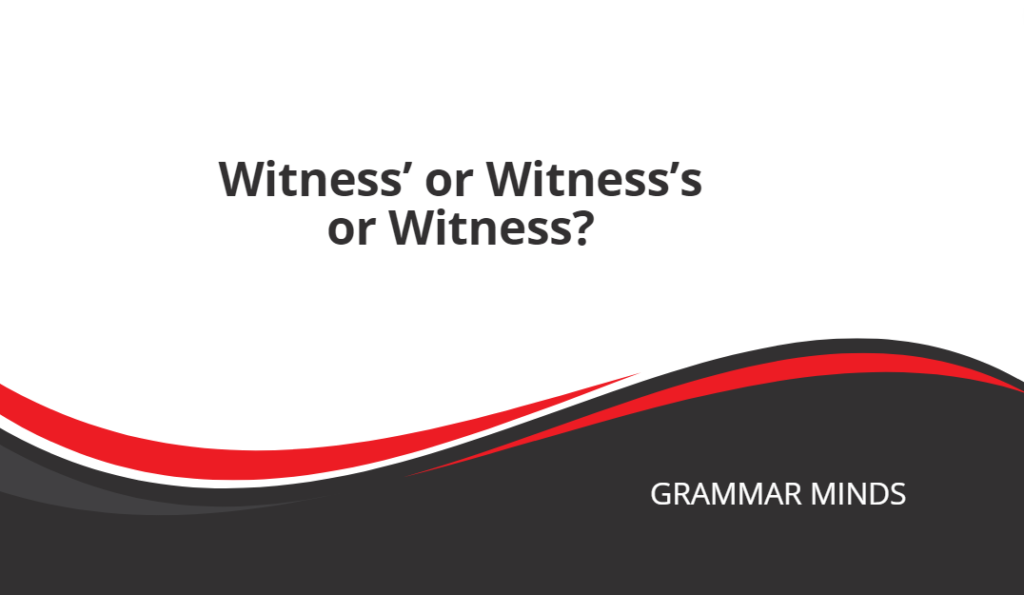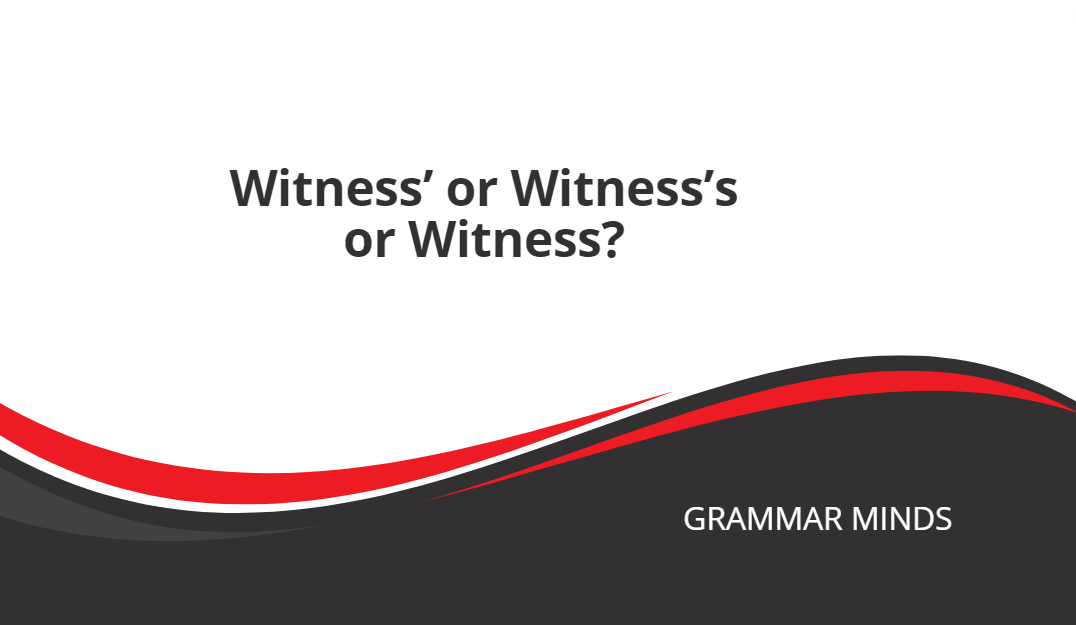
The word witness’s is the singular possessive form of witness guided by both the Associated press stylebook and the Chicago Manual of style E.g., “The witness’s testimony was crucial to the case.” Also, witness’ is a plural possessive of witness. Witnesses is the standard plural form of witness.
The following chart provides an overview of the different forms of the word witness.
| Form | Example |
| Singular: | Witness |
| Plural: | Witnesses |
| Singular possessive: | Witness’s / witness’ |
| Plural possessive: | Witnesses’ |
As you can see, the word witness has a regular plural that you form by adding an “es.”
Furthermore, you create the singular possessives with either an apostrophe between the “s” and the additional “s.” or by simply adding an apostrophe at the end
Also, you make the plural possessive with an apostrophe at the end of the word witnesses.
The following examples show the different forms in context.
Singular: The witness identified the suspect in the police lineup.
Plural: Multiple witnesses saw the accident and provided statements to the police.
Singular possessive: The witness’s account of the events was detailed and precise.
Singular possessive: The witness’ information gave officers an insight of what transpired
Plural possessive: The court considered the witnesses’ perspectives during the trial.
To ensure that you never make a mistake with the possessive forms of witness, please continue reading the rest of the page to learn more about the different forms and how to use them in your writing.
Witness’s
Witness’s is the singular possessive form of the word witness.
This is the form recommended by many stylebooks including the Chicago manual of style and the AP stylebook.
Therefore, you can use it to mention things that belong to one witness.
These things can be intangible things such as accounts or perspectives. As shown in this example:
- The witness’s account of the incident was vital in reconstructing the sequence of events.
- The witness’s perception of the situation influenced the jury’s decision.
- The witness’s detailed description of the suspect helped the police make an arrest.
- The witness’s courage in coming forward was commendable.
You can also use the singular possessive to refer to physical objects possessed by one witness. For example:
- The witness’s car was parked near the crime scene during the incident.
- The notes in the witness’s handwriting were presented as evidence in court.
- The witness’s phone contained important photos related to the case.
Furthermore, the word witness’s may appear in common phrases such as witness’s stand, referring to the place where a witness testifies during a trial.
- The witness confidently took the witness’s stand and answered the lawyer’s questions.
- The attorney cross-examined the witness on the witness’s stand.
Witness’
Witness’ is another singular possessive form used for witness. It is not so popular in modern English but commonly used when the following word starts with an “s”:
- The witness’ statement was significant in solving the case.
- We heard the witness’ side of the story during the trial.
- The detective valued the witness’ support in identifying the suspect.
- The court considered the witness’ sworn testimony as crucial evidence.
- The attorney appreciated the witness’ strong cooperation throughout the investigation.
Witnesses’
The word witnesses’ is the plural possessive form of the word witness, and you use it when stating that something belongs to multiple witnesses.
The thing that belongs to witnesses can be something physical, like documents or observations.
For example:
- The witnesses’ statements were consistent and strengthened the case.
- The witnesses’ accounts of the incident provided a comprehensive view.
- The photographs in the witnesses’ possession were admitted as evidence.
- The witnesses’ collaboration during the investigation was crucial.
Furthermore, you can use witnesses’ for other things that are not physical, such as words, stances, or periods of time.
For example:
- The witnesses’ unanimous agreement on the details helped the jury reach a verdict.
- The witnesses’ perspectives were taken into account during the trial.
- The witnesses’ collective memory of the event was essential for a fair judgment.
- The first example has a capital letter because it is an official part of a legal proceeding.
Witnesses
The term witnesses is the plural version of the word witness.
Therefore, you can use it to mention a specified number of witnesses:
- The three witnesses were called to testify on the same day.
- The group of witnesses gathered to share their experiences with the investigators.
- The two witnesses collaborated to create a timeline of the events.
Or, you can use it to refer to all witnesses:
- Witnesses play a critical role in bringing justice to the legal system.
- Witnesses are essential in providing firsthand accounts of events.
- I appreciate the courage of witnesses who come forward to help solve crimes.
- Witnesses are often recognized for their contributions to the justice system.
Furthermore, you can use the word witnesses to mention one witness if you combine it with other terms, such as:
- One of the key witnesses in the trial was Ms. Johnson.
- One of the witnesses, Mr. Rodriguez, was an expert in forensic analysis.
- Among all the witnesses, Dr. Smith had the most profound impact on the case.







